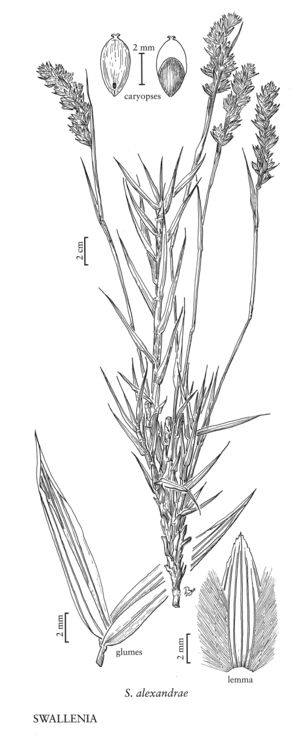Difference between revisions of "Swallenia alexandrae"
Common names: Eureka valley dunegrass
Synonyms: Ectosperma alexandrae unknown
Treatment appears in FNA Volume 25. Treatment on page 24.
FNA>Volume Importer |
FNA>Volume Importer |
||
| Line 20: | Line 20: | ||
-->{{Treatment/Body | -->{{Treatment/Body | ||
|distribution=Calif. | |distribution=Calif. | ||
| − | |discussion=<p>Swallenia alexandrae grows on sand dunes in Inyo County, California. It is only known from four sites, all between 900-1200 m, in the Eureka Valley of northern Inyo County. At these sites, it forms dense colonies 1-2 m across. It is state-listed as rare and federally-listed as endangered because of off-road vehicle activity.</p> | + | |discussion=<p><i>Swallenia alexandrae</i> grows on sand dunes in Inyo County, California. It is only known from four sites, all between 900-1200 m, in the Eureka Valley of northern Inyo County. At these sites, it forms dense colonies 1-2 m across. It is state-listed as rare and federally-listed as endangered because of off-road vehicle activity.</p> |
|tables= | |tables= | ||
|references= | |references= | ||
| Line 41: | Line 41: | ||
|publication year= | |publication year= | ||
|special status= | |special status= | ||
| − | |source xml=https://jpend@bitbucket.org/aafc-mbb/fna-data-curation.git/src/ | + | |source xml=https://jpend@bitbucket.org/aafc-mbb/fna-data-curation.git/src/8f726806613d60c220dc4493de13607dd3150896/coarse_grained_fna_xml/V25/V25_33.xml |
|subfamily=Poaceae subfam. Chloridoideae | |subfamily=Poaceae subfam. Chloridoideae | ||
|tribe=Poaceae tribe Cynodonteae | |tribe=Poaceae tribe Cynodonteae | ||
Revision as of 16:33, 18 September 2019
Culms 10-40(60) cm, stiff, erect; nodes villous. Sheaths villous on the upper margins; blades 5-14 cm long, 3-8 mm wide. Panicles 4-10 cm; branches to 35 mm, with 1-3 spikelets. Spikelets 10-15 mm, persistent. Glumes 9-14 mm; lemmas 7-9 mm. Caryopses about 4 mm long, about 2 mm in diameter. 2n = 20.
Discussion
Swallenia alexandrae grows on sand dunes in Inyo County, California. It is only known from four sites, all between 900-1200 m, in the Eureka Valley of northern Inyo County. At these sites, it forms dense colonies 1-2 m across. It is state-listed as rare and federally-listed as endangered because of off-road vehicle activity.
Selected References
None.
Lower Taxa
None.
